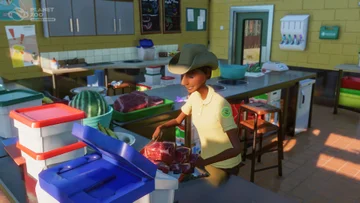
A Beginner's Guide to Planet Zoo – Staff & Guests
Learn how to manage the people of Planet Zoo
Hayo Zookeepers!
A zoo is nothing without the staff to run it and the guests to enjoy it! In this part of our Beginner’s Guide to Planet Zoo we’ll cover everything you need to know about staffing your zoo and keeping your guests happy and educated.
Staff

Staff are the lifeblood of your zoo and keep it running like a well oiled machine.
How to Hire Staff
Staff are hired from the Staff page in the Zoo Management screen or from the Staff List in the browser on console. When the desired staff member has been selected, they will become attached to the reticle and be deployed by placing them on a path.
Staff can still be hired even if the zoo has negative funds, which can help you recover from any temporary setbacks. Be careful though! If you can't pay your staff they're likely to quit, so be sure to resolve any funding issues quickly.
Vendors are automatically hired when a shop is placed, but additional vendors can be hired to support shops when staff are taking breaks.
Types of Staff
Keepers

Keepers maintain the welfare of the animals in the zoo. They are responsible for the following activities:
- Cleaning habitats and exhibits.
- Feeding animals.
- Watering animals.
- Reporting sickness and injuries.
- Removing skeletons.
Keepers require a keeper hut to perform their feeding duties.
Vets

Vets maintain the physical wellbeing of the animals in the zoo. They are responsible for the following activities:
- Treatment of illness.
- Treatment of injury.
- Capturing escaped animals.
- Removing corpses.
- Researching animals.
- Transporting animals (low priority).
Vets require a vet surgery to treat animals and a research centre to perform animal research.
Caretakers
Caretakers look after the zoo and help with transportation duties. They are responsible for the following activities:
- Transporting boxed animals (high priority).
- Cleaning paths.
- Emptying bins.
- Cleaning toilets.
Vendors
Vendors are assigned to shops and will serve guests. If a shop does not have a vendor then customers cannot be served. When a shop is purchased, a vendor will automatically be hired.
Mechanics

Mechanics look after the physical infrastructure of the zoo. They are responsible for the following services:
- Repairing habitat walls.
- Repairing power facilities.
- Repairing water treatment facilities.
- Repairing vandalised items such as bins, benches and signs.
- Researching new facilities and scenery items.
Mechanics require a workshop to perform their research duties.
Security Guards
Security guards protect the zoo from the following threats:
- Vandals.
- Thieves.
- Guests feeding the animals.
- Guests distressing the animals.
Educators

Educators primarily focus on raising your guests' education via Animal Talks. When assigned to an Animal Talk, educators will attempt to reach the talk up to three months in advance, waiting at the talk point until it is scheduled to begin. If an educator misses their talk, it will be cancelled, and the guests will be unhappy! Educators can also be assigned to present roaming talks if they currently are not busy with a scheduled animal talk.
Educators will return to a staff room between talks if they have nothing else to do, to make sure they have energy for the next talk.
Staff Needs
Staff have needs that must be satisfied to keep them in the best working condition.
Staff have an energy level which declines over time and will drop more rapidly if the staff member has a heavy workload. This energy replenishes when resting at a staff room. Staff also have a happiness status. This can be maintained by paying the staff member well and surrounding their working environment with attractive scenery. Exhausted staff also tend to become unhappy; unhappy staff are likely to quit.
Staff Training
Training staff is a great way to improve their happiness, efficiency, resilience and work rate.
All staff enter the zoo with a one star rating and can be trained up to five stars. Training can be arranged for a member of staff either in the Training tab of the staff member's info panel or on the Staff Page in the Zoo Management screen.
There is a nonrefundable cost to arrange training for a staff member. Staff members will receive their training the next time they visit a staff room to rest and they will expect an improved salary after each training level.
Staff Work Zones
Work zones can be used to dramatically improve efficiency in the zoo and can be critical for ensuring keepers look after habitats. A work zone is a collection of facilities that can be assigned to one or more staff to limit where they will work.
Work zones can be created from the Zoo Management Work Zones page.
- Select 'Create New Work zone'
- Start adding facilities to the work zone by selecting them or by using multiselect.
- Select a facility again to remove it from the work zone.
- Name the work zone so it can be identified later All changes are automatically saved.
Staff can be assigned to any single work zone that has been created. This is done through the Zoo Management Staff Overview page or the Employment tab in the staff's info panel. Each staff member can be assigned to a work zone using the Work zones page - staff can also be reassigned from this location.
Guests

No zoo would be complete without guests to enjoy and learn more about the animals that call it home.
Guest Needs
All guests are unique. However, they do enter the zoo with a set of needs that they wish to fulfil or at least maintain.
Happiness
At 100% this indicates that the guest is as happy as possible, but over time the happiness level will tick down, meaning that the guest is becoming unhappy.
Low values for hunger, thirst, toilet, and energy will pull a guest's happiness down quickly, along with protesters, litter, vandalism, overcharging, nearby staff facilities and poorly looked after animals.
If guests become particularly unhappy for a period of time, then they will leave the zoo.
Happiness can be increased by giving the guests great views of healthy animals, providing them with interesting scenery, selling them souvenirs, charging fairly and sustaining their other needs.
Happy guests are more likely to spend money in the zoo, so it’s in your interest to keep them happy.
Hunger
At 100% this indicates that the guest is full, but over time the hunger level will tick down meaning that the guest is getting hungrier.
This need can be improved by the guest visiting a food shop, vending machine or restaurant.
Thirst
At 100% this indicates that the guest is fully hydrated, but over time the thirst level will tick down meaning that the guest is getting thirstier.
This need can be improved by the guest visiting a drink shop or a vending machine.
Toilet
At 100% this indicates that the guest has recently been to the bathroom, but over time, the toilet level will tick down meaning that the guest is becoming increasingly desperate.
This need can be satisfied by the guest visiting a bathroom.
Energy
At 100% this indicates that the guest is full of vigour and enthusiasm, but over time, the guest's energy level will tick down meaning that the guest is becoming tired.
This need can be improved by guests using benches, transport rides and some drink types such as coffee.
Education
Guests enter the zoo with no education and have a desire to learn new things during their visit.
Education can be increased through animal talks, education boards, conservation boards, education speakers and audio guides. The amount of education provided by these depends on the research level of the animal being highlighted.
A better educated guest will want to spend more cash in your zoo; the higher a guest's education the bigger the bonus to their spending.
Make sure they have plenty of opportunities to learn and spend!
Guest Wish Lists

Guests have a wish list of animals they particularly want to see on their visit. Animals on this wish list are more likely to attract the guest's attention and therefore steer them through the zoo.
Guests get a boost to happiness for viewing animals on their wish list, providing the animals are healthy at the time of viewing. Animals on wish lists are more likely to attract guests to use donation boxes and to purchase adoption packs at souvenir shops.
Guests Leaving
Guests will leave the zoo for any of the following reasons:
- They have seen all of the animals.
- They have run out of time.
- They are particularly unhappy.
- They are fleeing an escaped animal.
Protestors

Protesters will enter your zoo if an animal's overall welfare rating falls into the red zone. A well-run zoo should not see protests!
Once protestors have entered a zoo they will make their way to the animal's location before loudly protesting. Guests in proximity to protesters will have the animal's plight highlighted to them and this will in turn make them unhappy and may even cause them to leave the zoo!
In this way protesters aim to improve the welfare of animals by having an impact on the zoo's profitability.
Protesters cannot be forcefully removed from the zoo and will only leave once the animal's welfare has been raised, and maintained at this improved level, for a period of time.
Inspectors
The inspector periodically enters zoos to make sure they are being well run and that animals are being looked after. They will choose up to five animals to inspect and will make their way around the zoo attempting to ascertain the animals’ wellbeing.
Animals are assumed to be in fine condition until proved otherwise. An animal that cannot be inspected is assumed to be in the worst condition possible. The inspector can issue spot fines for poorly performing habitats, dead or sick animals and any form of escape.
Once the inspection is complete, a report is issued providing details as to the running state of the zoo.
Reporters
The reporter acts in a very similar way to the inspector, periodically entering the zoo to check on how well it's being run. The key difference is the reporter cares about more than just the animals - they will also check your zoo's Cleanliness, Crime, Education, Finances, Guests and Staff.
Once the Reporter has finished, a report will be issued providing details as to the running state of your zoo.
You should now have the knowledge you need to keep your staff happy and productive, while also making sure your guests have the best possible educational visit to your zoo!
Need to refresh your knowledge on how to care for the animals in your zoo? Head back to the previous entry in this series and learn more about Planet Zoo’s animals. Ready to become a management genius and lead your zoo to success? Move on to the next and final entry of the series, where we discuss how to manage your zoo.
Planet Zoo: Console Edition is available to buy now on PlayStation 5 and Xbox Series X|S.
Follow our social channels for the latest news and info about Planet Zoo.
Оставайтесь на связи
Оставайтесь на связи и будьте в курсе всех новостей и последних обновлений, касающихся игры Planet Zoo.


